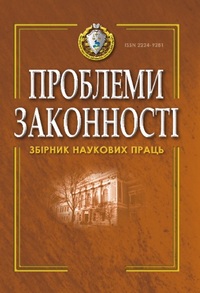Суди звичаєвого права на теренах пострадянських держав: історія та сучасний стан
Courts of customary law in the post-soviet states: history and the current situation
Author(s): Sergiy VasilievSubject(s): Law, Constitution, Jurisprudence, History of Law
Published by: Національний юридичний університет імені Ярослава Мудрого
Keywords: Customary law; courts of traditional law; civil proceedings; reconciliation procedures
Summary/Abstract: Problem setting and relevance of the research topic. Research of courts of customary law is not a new trend in the domestic legal science. However, it should be noted that this issue was covered mainly in the historical and ethnographic aspect, and, as a rule, in relation to specific countries or peoples. Taking into account the fact that in some post-Soviet states the rules of the customary law have remained and take effect even under the current conditions, there is a need to study people’s judgment on the basis of historical experience, taking into account the fact that there is no special scientific research on this subject.Paper objective. On the basis of studying the courts of customary law that existed in the territory of the post-Soviet states, to reveal their diversity, special features and peculiarities of formation and to analyze the contemporary forms of the aforementioned courts.Paper main body. The courts of customary law existed in various nations and nationalities since ancient times. The identity of one or another traditional court depended on such facts as the territorial location of the community, the level of economic and cultural development, type of religion, etc.In this paper the organization of the traditional justice of post-Soviet states in the second half of the XIX century was studied, when the basic territorial boundaries of the Russian Empire were formed. It is within these boundaries the peoples lived, who subsequently became Soviet republics, and then independent states.The main characteristic features of traditional courts that existed in the territory of post-Soviet states have been emphasized (1) judicial procedure was not regulated in detail; (2) the rules of the customary law (adat rules) were the basis of the justice; (3) members of the court were competent persons of the community; (4) the court was common for all members of the community; (5) disputes were resolved through reconciliation of the parties; (6) the court could function as a non-judicial body and a constant one; (7) in the trial the evidence was as follows: actual recognition; material evidence; statements by witnesses; oath; (9) a special place of the court was established; (10) a court decision was binding.Conclusions of the research. At the present moment we can talk about the kind of reception of the institute of traditional (national) justice, which is supported both by the population of the relevant post-Soviet states and their public authorities. This fact is explained by the fact that the essence and purpose of the traditional justice, since its origin and up till now has not changed, and it is as follows: (1) authority of the court (judges); (2) ensuring harmony between a person and the society, based on the confidence of the members of the process in a fair solution of the dispute; (3) justice serves as a means of reconciliation, not as a tool of clear application of positive law.
Journal: Проблеми законності
- Issue Year: 2015
- Issue No: 131
- Page Range: 15-25
- Page Count: 11
- Language: Ukrainian

